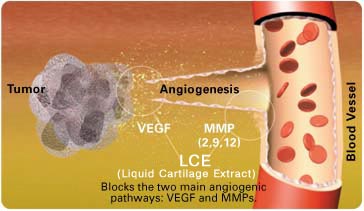

工作时间 :
周一~~周五
9:00 -18:00
在非工作时间,您可以通过邮件订购产品,订购时请写明详细联系方式,谢谢支持!
销售:18321282235
技术:021-60514606
传真:021-37680378


顾经理微信 扫一扫,关注我们

Angioworld
|
Angioworld Process of Angiogenesis Physiological and pathological angiogenesis |
|
|
Angioworld Almost all tissues develop a vascular network that provides cells with nutrients and oxygen and enables them to eliminate metabolic wastes. Once formed, the vascular network is a stable system that regenerates slowly. In physiological conditions, angiogenesis occurs primarily in embryo development, during wound healing and in response to ovulation.However, pathological angiogenesis, or the abnormal rapid proliferation of blood vessels, is implicated in over 20 diseases, including cancer, psoriasis and age-related macular degeneration. |
|
|
Angioworld The angiogenic sequence
|
|
|
|
|
|
Angioworld The normal regulation of angiogenesis is governed by a fine balance between factors that induce the formation of blood vessels and those that halt or inhibit the process. When this balance is destroyed, it usually results in pathological angiogenesis which causes increased blood-vessel formation in diseases that depend on angiogenesis. More than 20 endogenous positive regulators of angiogenesis have been described, including growth factors, matrix metalloproteinases, cytokines, and integrins. Growth factors, such as vascular endothelial growth factor (VEGF), transforming growth factors (TGF-beta), fibroblast growth factors (FGF), epidermal growth factor (EGF), angiogenin, can induce the division of cultured endothelial cells thus indicating a direct action on these cells.However, other factors have virtually no effect on the division of cultured endothelial cells or, in the case of TGF-beta and TNF-alpha, paradoxically inhibit their growth indicating that their angiogenic action is indirect. |
Angioworld
A liquid cartilage extract as an adjuvant to conventional cancer treatment
Dominique R. Garrel, (MD, CSPQ), 2005
A New Perspective on Cancer
The way we think of a disease has profound implications in terms of its treatment. The concept of cancer as a monolithic terminal illness raised the hope of “winning the war on cancer”. This idea has led to the development of successive generations of weapons used at their maxi- mum tolerated dose. While the strategy appears useful in prolonging survival, complete remission remains a rare event. This is because even if only one single enemy is spared, it can still raise an army of new, now resistant, cancer cells that can strike again in a fatal breaking wave.
As the long hoped for idea of a universal cure for cancer fades away, a new vision of multidisciplinary complemen- tary approaches emerges and opens the door to mixed protocols that combine alternative therapies with more conventional cancer treatments.
Angioworld
Process of Angiogenesis
Physiological and pathological angiogenesis
Almost all tissues develop a vascular network that provides cells with nutrients and oxygen and enables them to eliminate metabolic wastes. Once formed, the vascular network is a stable system that regenerates slowly. In physiological conditions, angiogenesis occurs primarily in embryo development, during wound healing and in response to ovulation. However, pathological angiogenesis, or the abnormal rapid proliferation of blood vessels, is implicated in over 20 diseases, including cancer, psoriasis and age-related macular degeneration.
Angioworld
Angiogenesis in cancer
How angiogenesis complicates cancer
Angiogenesis performs a critical role in the development of cancer. Solid tumors smaller than 1 to 2 cubic millimeters are not vascularized. To spread, they need to be supplied by blood vessels that bring oxygen and nutrients and remove metabolic wastes. Beyond the critical volume of 2 cubic millimeters, oxygen and nutrients have difficulty diffusing to the cells in the center of the tumor, causing a state of cellular hypoxia that marks the onset of tumoral angiogenesis. New blood vessel development is an important process in tumor progression. It favors the transition from hyperplasia to neoplasia i.e. the passage from a state of cellular multiplication to a state of uncontrolled proliferation characteristic of tumor cells. Neovascularization also influences the dissemination of cancer cells throughout the entire body eventually leading to metastasis formation.The vascularization level of a solid tumor is thought to be an excellent indicator of its metastatic potential.
Angioworld
A natural Liquid Cartilage Extract brings new hope for patients with metastatic renal cell carcinoma
By Dominique Garrel, M.D. CSPQ Professor of Medicine Director, Department of Nutrition, University of Montreal
Abstract
The latest progress and trends in antiangiogenic therapy were recently presented at the « Angiogenesis : New Opportunities & Solutions for Drug Development” meeting held on September 29-30, 2003 in Cambridge, Massachusetts. The conference featured Dr. Judah Folkman, M.D., a pioneer in angiogenesis research, as keynote speaker. Biopharmaceutical leaders in the field also presented their latest reports of ongoing clinical trials. Much awaited for by all attendees, were the results of a recently completed Phase III trial of a natural liquid cartilage extract (LCE) as monotherapy for stage IV metastatic renal cell carcinoma (RCC) refractory to conventional treatments. Patients enrolled in the study were stratified into four groups, according to their ECOG status (0 or 1) and the number of metastatic sites (1 or more than 1). Results from this placebo controlled, double-blind clinical trial revealed a significant survival advantage for a cohort of patients with clear cell histology, an ECOG=0, and a single metastatic site. For this preplanned group of 38 patients, oral administration of LCE more than doubled life expectancy, 26.3 months for LCE compared to 12.6 months for placebo, with a convincing pvalue= 0.02. For the first time ever, a group of patients with metastatic RCC refractory to the standard of treatment showed statistically significant clinical benefits with a natural product. Once again LCE confirmed its outstanding safety profile. LCE success in such harsh conditions augurs well for its use in first line combination therapies.
温馨提示:不可用于临床治疗。
部门 |
姓名 | 手机 | |||
| 销售部 | 顾先生 | 1916510334@qq.com | 18321282235 | 1916510334 | |
| 技术部 | 技术支持 | 1781364813@qq.com | 13816899465 | 1781364813 |
全国免费电话:18321282235
销售: 18321282235
86-21-60514606
技术: 13816899465
传真: 021-37680378










